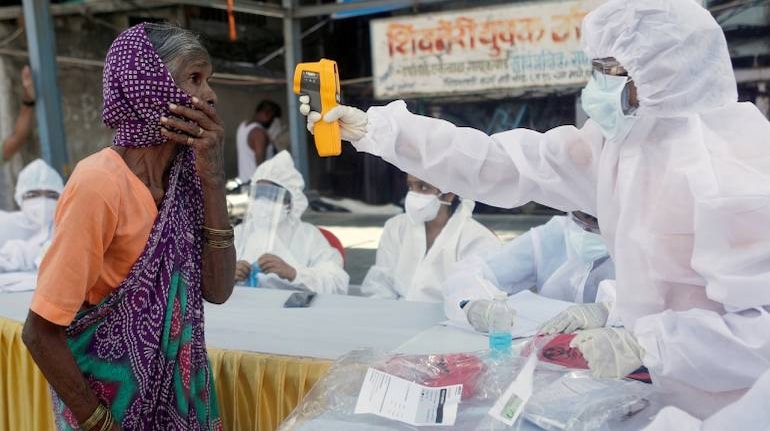
Many textile or garment companies had got into the business to make a quick buck and compensate for the losses in their core operations
Lucknow-based Karam Industries, which manufactures industrial personal safety products like helmets, goggles, face shields, and work boots, started making coveralls and masks, to take advantage of the huge demand for personal protection equipment (PPE), especially for healthcare workers.
Karam and many other firms which took advantage of COVID-19 are now facing a glut in supply and fall in prices.
Karam's two factories in Lucknow (Uttar Pradesh) and Sitarganj (Uttarakhand) have been on an overdrive, churning out PPEs in thousands per day. It is among top-10 PPE suppliers in India.
A PPE mainly includes non-reusable items like coverall that covers from head to toe, reusable face shields and goggles, and triple- layered medical masks and N95 respirator masks.
"We can scale up our coverall manufacturing to 10,000 units per day, but we are confining ourselves to 2000, as per the demand-supply situation," Sandeep Arora, national sales head, Karam Industries, said.
Everyone’s busy making PPEs
Karam isn’t alone. Around 500-600 manufacturers of all hues -- from cottage-sized garment makers to big textile companies, such as Arvind Mills and Welspun, have all started making PPEs.
Predictably, some of these manufacturers, which are seeing a huge slump in their textile or garment business, got into the PPE business to make a quick buck and compensate for the loss of their core business.
According to the Association of Indian Medical Device Industry (AiMeD), the pre-COVID-19 manufacturing capacity was 6.24 million units per annum. By the end of June, it has risen 43 times to 250.98 million pieces per annum.
In the same period, the manufacturing capacity of N95 masks increased from 13.82 million pieces per annum to 799.24 million -- an increase of 57 times.
The supply glut has led to the prices of PPEs falling almost by half, say manufacturers. “Earlier, they used to cost around Rs 1200- Rs 1500, but now a good quality, genuinely certified medical coverall cost about Rs 700- Rs 800," Arora said.
PPE prices have further fallen and are now quoting as low Rs 400 - Rs 500. Industry insiders say that the government has enough buffer stock that could last till October.
Under a lot of pressure from the textile lobby, the government, towards June-end, allowed the export of PPE medical coveralls with a monthly quota of 50 lakh. But manufacturers say this is too little, too late. The government had banned exports early this year.
"Manufacturers have to compete with zero duty imports flooding the market and restrictions on exports … manufacturers are staring at non-remunerative prices, unsold inventories, and overburdened loans," said Rajiv Nath, Forum Coordinator of AiMeD.
Nath calls on the government to free up exports as well as increase custom duties on imports to 15 percent to save the industry.
Sanitizers too face oversupply
The story isn't any different for sanitizers. Hundreds of brands have flooded the market. For instance, Indus Health Plus, which is into preventive health check-up, launched its own hand sanitizer in May to meet "urgent consumer needs".
"The product ‘Indus’ is mainly aimed at organisations, and institutions to ensure safety and prevention from the virus," said Amol Naikawadi, Joint Managing Director, Indus Health Plus.
But he says there is tremendous pricing pressure due to competition. The prices of sanitizers, too, were hitting the roof, when the government capped the prices of pharmaceutical grade. Finally, with the glut in the market, the government removed the cap early on July. Now, a 100-ml sanitizer is available for Rs 50.
Indus Health says as the market is brimming with different brands, there will be a negligible impact on pricing.
Quality is still a problem
Even as the domestic industry is producing more than enough PPE kits and sanitizers, experts say quality remains a problem.
"For PPEs, there were no specifications or standards during the initial months. The Bureau of Indian Standards (BIS) was still working on specifications, and we were taking reference from US and European standards," Arora of Karam said.
Eight labs, including the South India Textile Research Association (SITRA), Defence Research & Development Establishment (DRDO), and Ordnance Factory Board and Textiles Committee, can validate samples of coveralls and issue certificates.
Still it remains a huge challenge to verify the quality of the products supplied in the market are the certified grades. Hospitals like Hinduja at Khar, Mumbai, do their own quality check before buying coveralls.
"During the first 15-20 days of COVID-19, we had problems of which one is good and bad, but now we have standardised our testing. We buy only whatever is good," said Joy Chakraborty, Chief Operating Officer, Hinduja Hospital.
Arora of Karam says now there is more awareness among hospitals and doctors, and manufacturers who focus on quality and capacity, would survive, the rest would perish.
Discover the latest business news, Sensex, and Nifty updates. Obtain Personal Finance insights, tax queries, and expert opinions on Moneycontrol or download the Moneycontrol App to stay updated!